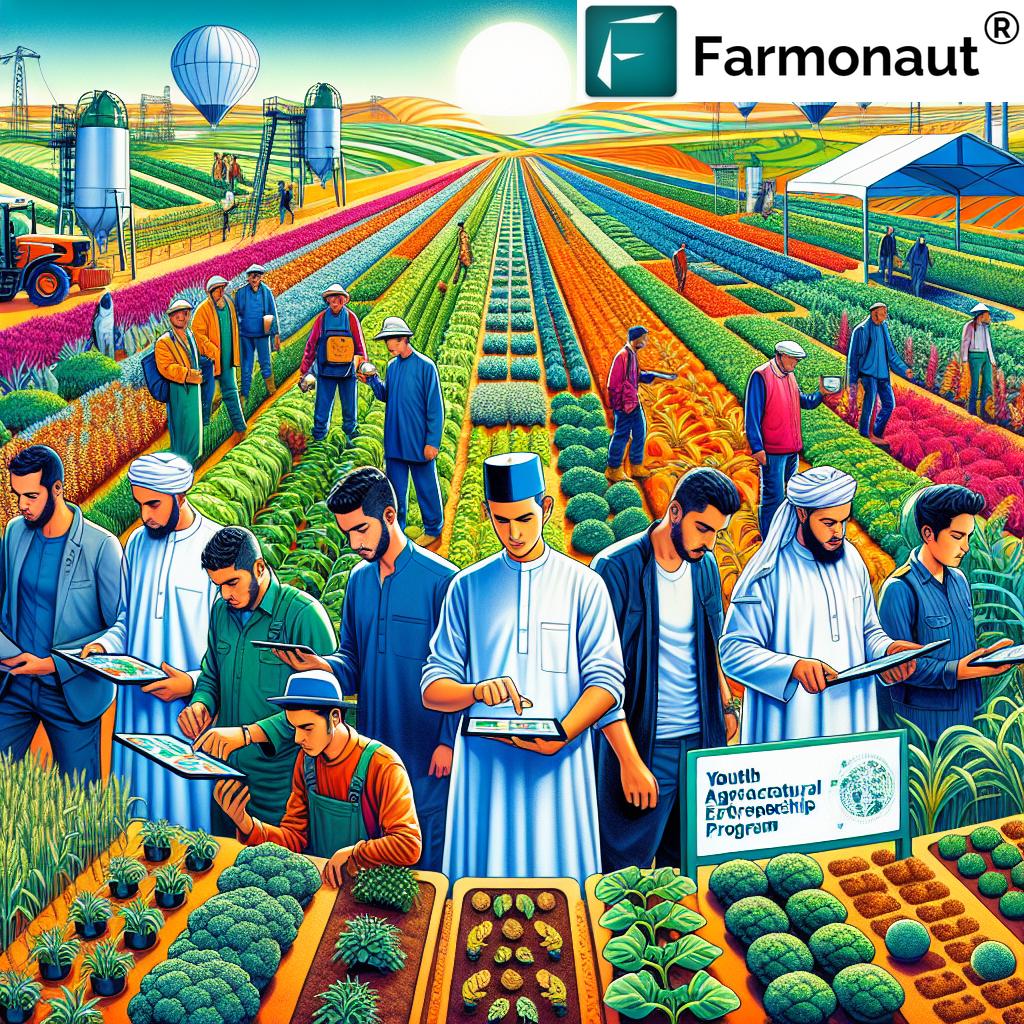Empowering Tunisia’s Youth: Sustainable Agribusiness Investment Boosts Employment in Agriculture
“Tunisia’s $7 million agribusiness project aims to create 1,200 jobs in farming over 36 months, focusing on rural youth.”
At Farmonaut, we are excited to explore a groundbreaking initiative in Tunisia that aligns perfectly with our mission of making precision agriculture accessible and sustainable. This innovative project, aimed at boosting youth employment in agriculture and fostering sustainable agribusiness investment, represents a significant step forward in addressing the challenges faced by Tunisia’s agricultural sector and its youth population.

The Multi-Partner Trust Fund: A Catalyst for Change
The initiative we’re discussing today is part of a larger effort known as the Multi-Partner Trust Fund for Youth and Employment in Tunisia (MPTF). Launched on November 28, 2020, this fund represents a collaborative effort between the Tunisian government and the United Nations. Its primary goal? To enhance employment opportunities for youth and foster financial independence in a country where youth unemployment has long been a pressing issue.
The Netherlands has emerged as the first donor to this transformative fund, contributing over $10.5 million. This generous support underscores the international community’s commitment to addressing unemployment and supporting vulnerable populations in Tunisia.
Project Overview: “Responsible Agribusiness Investment for Youth Employment, Food Systems Transformation and Sustainable Development”
- Funding: $7 million (approximately TND 22 million)
- Duration: 36 months
- Goal: Create at least 1,200 direct and indirect employment opportunities
- Focus: Youth entrepreneurship in agriculture
- Execution partners: United Nations Food and Agriculture Organisation (FAO) and International Labor Organisation (ILO)
This project marks the first initiative financed through the MPTF and was a key topic of discussion during the fund’s second annual meeting held on November 18 in Tunis. The meeting brought together representatives from the Tunisian government, the United Nations in Tunisia, and the Netherlands Embassy, all emphasizing the crucial need for a structured funding and coordination mechanism to bolster government-led job creation efforts effectively.
Addressing Critical Challenges in Tunisia’s Agricultural Sector
Tunisia’s agricultural sector faces several challenges that this initiative aims to address:
- High youth unemployment rates, particularly in rural areas
- Limited access to financial and technical support for young entrepreneurs
- Need for modernization and sustainable practices in agriculture
- Inclusion of marginalized groups, including women and individuals with disabilities
- Transition of informal workers to the formal economy
By focusing on these areas, the project aligns closely with Tunisia’s Vision 2035 and contributes to achieving multiple Sustainable Development Goals (SDGs) outlined in the 2030 Agenda.
The Role of Technology in Transforming Tunisia’s Agriculture
At Farmonaut, we understand the transformative power of technology in agriculture. Our satellite-based farm management solutions have been instrumental in helping farmers worldwide optimize their operations, and we believe similar technologies can play a crucial role in Tunisia’s agricultural revolution.
Here’s how advanced agritech solutions can contribute to the success of this initiative:
- Precision Agriculture: Satellite imagery and AI-driven insights can help Tunisian farmers make data-driven decisions, optimizing resource use and improving yields.
- Digital Advisory Services: AI-powered platforms can provide personalized recommendations to farmers, enhancing their knowledge and skills.
- Supply Chain Transparency: Blockchain-based traceability solutions can improve market access for small-scale farmers and build trust in Tunisian agricultural products.
- Resource Management: Advanced tools for fleet and resource management can help agribusinesses operate more efficiently, creating room for job growth.
To explore how Farmonaut’s solutions can support agricultural development, check out our web application or download our mobile apps:
Empowering Youth Through Agricultural Entrepreneurship
One of the most exciting aspects of this initiative is its focus on empowering young entrepreneurs in the agricultural sector. By providing both financial and technical support, the project aims to create a new generation of agripreneurs who can drive innovation and sustainability in Tunisia’s food systems.
Key aspects of youth empowerment in this project include:
- Training programs in modern agricultural techniques and business management
- Access to startup capital and ongoing financial support
- Mentorship from experienced agricultural professionals
- Networking opportunities within the agribusiness sector
- Exposure to international best practices in sustainable agriculture
“The initiative in Tunisia aligns with Vision 2035 and contributes to achieving multiple Sustainable Development Goals simultaneously.”
Fostering Inclusivity and Sustainable Development
What sets this initiative apart is its strong focus on inclusivity and sustainable development. The project specifically targets:
- Women in Agriculture: Promoting gender equality by creating opportunities for women to lead in the agribusiness sector.
- Individuals with Disabilities: Ensuring that people with disabilities have equal access to employment opportunities in agriculture.
- Informal Workers: Facilitating the transition of informal agricultural workers into the formal economy, providing them with better job security and benefits.
This inclusive approach not only addresses unemployment but also contributes to broader social equity and sustainable development goals.

The Impact of Sustainable Agribusiness Investment
Sustainable agribusiness investment is at the heart of this initiative. By promoting responsible investment practices, the project aims to create a ripple effect of positive outcomes:
- Increased agricultural productivity and efficiency
- Enhanced food security for Tunisia
- Improved rural livelihoods
- Environmental conservation through sustainable farming practices
- Strengthened agricultural value chains
To understand the potential impact of this initiative, let’s look at a comparative table showcasing the projected effects of the sustainable agribusiness investment project in Tunisia:
| Impact Area | Pre-Project Baseline (Estimated) | Project Goals | Expected Outcomes |
|---|---|---|---|
| Number of jobs created | N/A | 1,200 | 1,500+ |
| Youth employment rate in agriculture | 15% | 25% | 30% |
| Women’s participation in agribusiness | 20% | 35% | 40% |
| Inclusion of individuals with disabilities | 5% | 10% | 15% |
| Sustainable farming practices adopted | 30% | 60% | 70% |
| Agricultural GDP contribution | 10% | 15% | 18% |
Note: These figures are projections based on the initiative’s goals and may vary as the project progresses.
Leveraging Technology for Sustainable Food Systems Transformation
At Farmonaut, we believe that technology plays a crucial role in transforming food systems and creating employment opportunities. Our suite of agritech solutions can contribute significantly to initiatives like this one in Tunisia. Here’s how:
- Satellite-Based Crop Health Monitoring: Our advanced satellite imagery analysis can help Tunisian farmers monitor crop health in real-time, optimizing resource use and improving yields.
- AI-Powered Advisory Systems: Our Jeevn AI system can provide personalized recommendations to farmers, enhancing their decision-making capabilities and productivity.
- Blockchain-Based Traceability: Our traceability solutions can help Tunisian agribusinesses build trust with consumers and access international markets.
- Resource Management Tools: Our fleet and resource management tools can help agribusinesses operate more efficiently, creating room for job growth and sustainability.
For developers interested in integrating these technologies into their own systems, we offer a comprehensive API. You can find our API Developer Docs here.
The Role of International Cooperation
This initiative is a prime example of how international cooperation can drive positive change. The collaboration between the Tunisian government, United Nations agencies (FAO and ILO), and donor countries like the Netherlands demonstrates the power of multilateral efforts in addressing complex socio-economic challenges.
Key aspects of this international cooperation include:
- Knowledge sharing and transfer of best practices
- Access to global networks and resources
- Alignment with international development goals (SDGs)
- Capacity building for local institutions
- Long-term commitment to Tunisia’s development
Challenges and Opportunities
While the initiative presents immense opportunities, it’s important to acknowledge potential challenges:
- Climate Change: Tunisia’s agriculture sector is vulnerable to climate impacts. Implementing climate-smart agriculture practices will be crucial.
- Market Access: Ensuring that new agribusinesses can access both domestic and international markets will be key to their success.
- Technology Adoption: There may be initial resistance to adopting new technologies. Comprehensive training and support will be necessary.
- Policy Environment: Continued policy support for youth entrepreneurship and sustainable agriculture will be essential for long-term success.
However, these challenges also present opportunities for innovation and growth. By addressing these issues head-on, Tunisia can position itself as a leader in sustainable agriculture and youth empowerment in the region.
The Future of Tunisia’s Agricultural Landscape
As this initiative unfolds over the next 36 months, we anticipate a transformation in Tunisia’s agricultural landscape. We envision:
- A new generation of tech-savvy agripreneurs driving innovation
- Increased adoption of sustainable and climate-smart agricultural practices
- Stronger, more resilient agricultural value chains
- Improved food security and rural livelihoods
- A more inclusive agricultural sector with increased participation of women and marginalized groups
This initiative has the potential to serve as a model for other countries in the region facing similar challenges in youth unemployment and agricultural development.
How Farmonaut Can Support Similar Initiatives
At Farmonaut, we’re committed to supporting sustainable agriculture and rural development worldwide. Our technologies and expertise can play a crucial role in initiatives like this one in Tunisia. Here’s how we can contribute:
- Affordable Precision Agriculture: Our satellite-based solutions make precision agriculture accessible to farmers of all scales, helping them optimize resource use and improve yields.
- Data-Driven Decision Making: Our AI-powered insights help farmers and agribusinesses make informed decisions, reducing risks and improving profitability.
- Sustainability Tracking: Our carbon footprinting tools can help agribusinesses monitor and reduce their environmental impact, aligning with global sustainability goals.
- Capacity Building: We can provide training and support to help farmers and agribusinesses adopt and benefit from new technologies.
To explore how Farmonaut can support agricultural development initiatives, visit our web application.
Conclusion: A Bright Future for Tunisia’s Agriculture and Youth
The sustainable agribusiness investment initiative in Tunisia represents a significant step towards addressing youth unemployment, promoting sustainable agriculture, and fostering inclusive economic growth. By combining financial support, technical assistance, and a focus on marginalized groups, this project has the potential to transform Tunisia’s agricultural landscape and create a model for sustainable development in the region.
As we at Farmonaut continue to innovate and provide cutting-edge agritech solutions, we’re excited to see how initiatives like this one in Tunisia leverage technology to empower youth, transform food systems, and create a more sustainable future for agriculture. We believe that by combining local knowledge, international cooperation, and advanced technologies, we can address global challenges in food security, employment, and sustainable development.
The future of agriculture in Tunisia looks bright, and we’re proud to be part of the global community working towards a more sustainable and inclusive agricultural sector. Together, we can create a world where technology empowers farmers, supports rural communities, and ensures food security for all.
FAQs
- Q: What is the main goal of the agribusiness investment project in Tunisia?
A: The main goal is to create at least 1,200 direct and indirect employment opportunities in the agricultural sector, focusing on youth entrepreneurship and sustainable practices. - Q: How long will the project run?
A: The project is set to span 36 months (3 years). - Q: Who are the key partners in this initiative?
A: The key partners include the Tunisian government, the United Nations Food and Agriculture Organisation (FAO), and the International Labor Organisation (ILO). - Q: How does this project address inclusivity?
A: The project specifically targets women, individuals with disabilities, and aims to transition informal workers into the formal economy. - Q: What role does technology play in this initiative?
A: Technology, particularly agritech solutions, plays a crucial role in modernizing farming practices, improving efficiency, and creating new opportunities for youth in agriculture.















